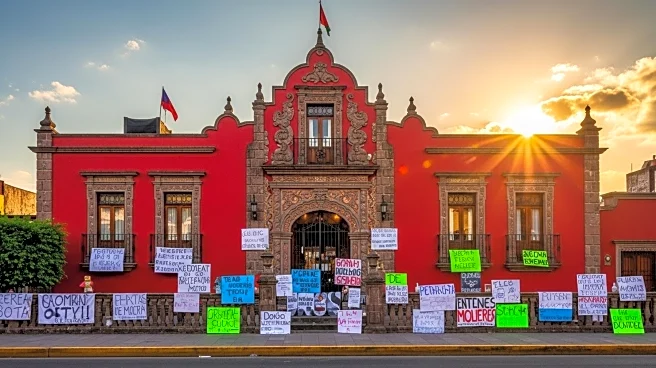What's Happening?
Recent protests in Mexico City have highlighted growing discontent among locals over gentrification, particularly in neighborhoods like Condesa, Roma, and La Juárez. Demonstrators, including long-term residents, have expressed frustration over rising rents, unregulated holiday lettings, and the influx of American and European tourists. The protests, which coincided with U.S. Independence Day, saw some radical elements vandalizing businesses catering to tourists. President Claudia Sheinbaum condemned the violence but acknowledged the legitimacy of concerns regarding gentrification. Activists argue that the displacement of residents is a result of speculative real estate practices and insufficient government intervention.
Why It's Important?
The protests underscore the broader issue of gentrification, which is reshaping urban landscapes globally, including in the U.S. The displacement of long-term residents in favor of short-term tourist accommodations raises questions about housing affordability and community rights. This trend can lead to social tensions and economic disparities, affecting local cultures and economies. The situation in Mexico City serves as a cautionary tale for U.S. cities facing similar challenges, highlighting the need for balanced urban development policies that protect vulnerable communities while accommodating growth.
What's Next?
In response to the protests, Mexico City's mayor has introduced a 14-point plan aimed at regulating rent prices and protecting long-term residents. However, activists believe these measures are insufficient and call for more comprehensive policies to address the root causes of gentrification. The ongoing debate may influence future urban planning and housing policies in Mexico and potentially inspire similar actions in U.S. cities grappling with gentrification.
Beyond the Headlines
The protests reveal deeper cultural and economic tensions between local residents and foreign tourists. The influx of Americans and Europeans, particularly during the pandemic, has exacerbated feelings of cultural displacement and economic inequality. This dynamic mirrors broader immigration debates, where movement from south to north is often restricted, yet the reverse is welcomed. The situation raises ethical questions about the responsibilities of tourists and expatriates in respecting local customs and contributing to the community.









